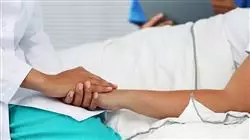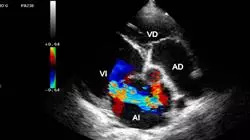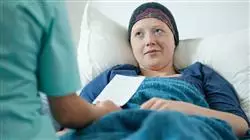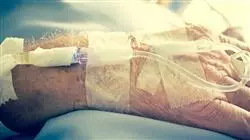University certificate
The world's largest faculty of medicine”
Description
This training will provide you with a sense of security in medical practice, which will help you grow personally and professionally”

Cancer patients often present pathologies associated with the oncological process that require care. On the other hand, approaches to cancer patients are often aggressive and can affect other systems, which in the case of frail patients is a major problem in managing risk in therapeutic choices.
The heart is undoubtedly one of the organs most affected by systemic cancer treatments, and considering the importance of its functioning, it becomes an area of study that requires rigor, depth and timeliness.
Cardiological affectation is routinely present in the side effects of most treatments for the oncology patient. The management of the medication, as well as of other therapeutic options, is fundamental in the adjustment of the appropriate dosage for medical praxis. Being up to date on the details of cardiac risk management in this type of patient is a fundamental skill for the physician to possess when dealing with the patient and his or her symptoms.
This program is designed to facilitate the specialist's updating process, so that he/she can include in the clinical practice of their patients all the innovations and the latest knowledge about oncological therapeutics.
Update your knowledge with the Postgraduate diploma in Affectation of Cardiac Structure and Function Mediated by Oncologic Treatments"
The Postgraduate diploma in Affectation of Cardiac Structure and Function Mediated by Oncologic Treatments contains the most complete and up to date scientific program on the market. The most important features of the program include:
- Development of case studies presented by experts on the cardiotoxic effect of oncological therapies. The graphic, schematic, and eminently practical contents with which they are created provide scientific and practical information on the disciplines that are essential for professional practice
- Developments on the cardiotoxic effect in heart disease
- It contains practical exercises where the self-evaluation process can be carried out to improve learning
- With special emphasis on innovative methodologies in cardiopathies of oncologic toxic etiology
- All of this will be complemented by theoretical lessons, questions to the expert, debate forums on controversial topics, and individual reflection assignments
- Content that is accessible from any fixed or portable device with an Internet connection
This Postgraduate diploma may be the best investment you can make in the selection of an updating program for two reasons: in addition to updating your knowledge in Affectation of Cardiac Structure and Function Mediated by Oncologic Treatments, you will obtain a Postgraduate diploma certificate from TECH Global University"
Its teaching staff includes professionals belonging to the field of cardiotoxic cardiopathies, who bring to this training the experience of their work, in addition to recognized specialists belonging to prestigious reference societies and universities.
The multimedia content developed with the latest educational technology will provide the professional with situated and contextual learning, i.e., a simulated environment that will provide immersive training program to train in real situations.
The design of this program is based on Problem-Based Learning, by means of which the student must try to solve the different professional practice situations that arise throughout the course. For this purpose, the student will be assisted by a innovative interactive video system developed by recognized experts in the field of Affectation of Cardiac Structure and Function Mediated by Oncologic Treatments, with extensive teaching experience.
Increase your decision-making confidence by updating your knowledge through this specialist course"

Take the opportunity to learn about the latest advances in the approach to oncologic cardiotoxic heart disease and improve the care of your patients"
Syllabus
The structure of the contents has been designed by a team of professionals from the best hospitals and universities in the country, aware of the relevance of current training to be able to intervene in the toxic effects of oncological therapies at the cardiac level, and committed to quality teaching through new educational technologies.

The Postgraduate diploma in Affectation of Cardiac Structure and Function Mediated by Oncologic Treatments contains the most complete and up to date scientific program on the market"
Module 1. Myocardial Toxicity
1.1. Incidence and Clinical Relevance
1.2. Pathophysiology of Ventricular Dysfunction and Heart Failure in the Context of Cardiotoxicity
1.3. Drugs Implicated in the Development of Ventricular Dysfunction and Heart Failure
1.3.1. Anthracyclines
1.3.2. Other Chemotherapy Drugs
1.3.3. Biological Agents: Monoclonal Antibodies
1.3.4. Therapies Aimed at New Molecular Targets: Inhibitors of Cellular Kinases
1.3.5. Proteosome Inhibitors
1.4. Radiotherapy and Heart Failur
1.5. Methods for Diagnosing Myocardial Involvement
1.5.1. Electrocardiogram
1.5.2. Echocardiography
1.5.3. Other Non-Invasive Imaging Techniques
1.6. Treatment Strategies
1.6.1. Treatment of Acute Heart Failure
1.6.2. Chronic Treatment of Patients with Ventricular Dysfunction
1.7. Presymptomatic Myocardial Involvement
1.7.1. Management of Patients with Elevated Circulating Biomarkers during Oncologic Treatment
1.7.2. Management of Patients with Preclinical Impairment of Ventricular Function during Oncologic Treatment
1.8. Monitoring Strategy during Treatment with Drugs Capable of Causing Myocardial Toxicity
1.8.1. Anthracyclines
1.8.2. Biological Agents: Monoclonal Antibodies
1.8.3. Therapies Aimed at New Molecular Targets: Inhibitors of Cellular Kinases
1.8.4. Immune Checkpoint Inhibitors
Module 2. Ischemic Heart Disease and Cardiotoxicity
2.1. Incidence of Ischemic Heart Disease in Oncology Patients
2.2. Identifying Patients at High Risk of Coronary Artery Disease
2.3. Pathophysiology of Ischemic Heart Disease in the Context of Oncologic Treatment
2.4. Pharmacologic Oncologic Therapies that are Associated with Ischemic Heart Disease
2.4.1. Fluoropyrimidine
2.4.2. Vascular Endothelial Growth Factor Inhibitors
2.4.3. Others (Cisplatin)
2.5. Diagnostic Methods for Coronary Artery Disease Related to Cardiotoxic Drugs
2.5.1. Electrocardiogram
2.5.2. Functional Tests
2.5.3. Non-Invasive Imaging Tests
2.5.4. Invasive Imaging Tests
2.6. Acute Coronary Syndrome in the Context of Oncologic Treatment
2.7. Monitoring and Treatment Strategy in the Patient with Coronary Ischemia
2.8. Thoracic Radiotherapy and Ischemic Heart Disease
2.8.1. Incidence and Pathophysiology of Radiation-Induced Coronary Artery Disease
2.8.2. Risk Factors for the Development of Ischemic Heart Disease in Radiotherapy Patients
2.8.3. Clinical Assessment and Diagnostic Methods of Coronary Heart Disease in Radiotherapy Patients
2.8.4. Treatment Options in Coronary Artery Disease Associated with Radiotherapy
2.9. Management of Chronic Ischemic Patients Receiving Oncologic Treatment
Module 3. Arrhythmias and Cardiotoxicity
3.1. Incidence and Pathophysiology of Cardiac Arrhythmias Related to Oncologic Treatments
3.2. QT Interval Prolongation: Causative Drugs and Associated Risk Factors
3.3. QT Interval Prolongation: Diagnostic Criteria and Risk Stratification of Ventricular Arrhythmias
3.4. QT Interval Prolongation: Prevention Strategies and Implications on the Continuity of Specific Treatment
3.5. Atrial Fibrillation: Incidence, Risk Factors, and Clinical Presentation
3.6. Atrial Fibrillation: Oncologic Treatments Involved in its Development
3.7. Atrial Fibrillation: Anticoagulant Treatment
3.7.1. Thrombotic and Hemorrhagic Risk Assessment
3.7.2. Anticoagulation with Heparin
3.7.3. Anticoagulation with Dicoumarinics
3.7.4. Direct-Acting Anticoagulants
3.8. Treatment Strategy in Atrial Fibrillation: Rate Control versus Rhythm Control
3.9. Bradyarrhythmias Associated with Oncologic Treatment
3.9.1. Sinus Dysfunction
3.9.2. Atrioventricular Block
3.9.3. Therapeutic Implications
Module 4. Valvular and Pericardial Involvement Related to Cardiotoxicity
4.1. Oncologic Treatments that May Lead to the Development of Valvulopathies
4.1.1. Pharmacological Treatments
4.1.2. Thoracic Radiotherapy
4.2. Management of Chronic Valvular Patients Receiving Oncologic Treatment
4.2.1. Mitral Valve Disease
4.2.2. Aortic Valve Disease
4.2.3. Valve Prosthesis
4.3. Pharmacological Treatments that May Lead to the Development of Pericardial Disease
4.3.1. Incidence and Physiopathology
4.3.2. Clinical Presentation and Diagnosis
4.3.3. Approach to Pericardial Effusion Secondary to Treatment
4.4. Thoracic Radiotherapy and Pericardial Disease
4.4.1. Acute Pericarditis
4.4.2. Chronic Pericarditis
4.5. Assessing Patients with Metastatic Pericardial Involvement

A unique, key, and decisive Training experience to boost your professional development”
Postgraduate Diploma in Affecting Cardiac Structure and Function Mediated by Oncological Treatments.
The relationship between oncological treatments and the affectation of the heart is a topic of vital importance in medical care. If you are a health professional and wish to specialize in this area, TECH Global University has the perfect program for you, the Postgraduate Diploma in Affectation of Cardiac Structure and Function Mediated by Oncological Treatments. The program will provide you with the knowledge you need to understand how oncology treatments can affect cardiac structure and function, as well as strategies to prevent, identify and treat these complications. Best of all, you will be able to do it through our online classes, which will allow you to access the information from anywhere and at any time. Over the course of 6 months, you will receive comprehensive training in the cardiac involvement associated with cancer treatments. You will learn about the underlying mechanisms of cardiovascular complications, monitoring and prevention strategies, as well as available treatment options. All of this will enable you to provide quality medical care and improve the quality of life of your patients.
Protect your patients' hearts with specialized knowledge.
At TECH Global University, we have a highly trained teaching team, made up of experts in cardiology and oncology. Through our interactive online classes, you will have the opportunity to interact with professors and classmates, participate in real-time discussions and resolve your doubts immediately. At the end of the program, you will receive a certificate, which will support your knowledge and experience in the affectation of cardiac structure and function mediated by oncological treatments. This certification will open up new career opportunities and highlight you as an expert in cardiovascular care in the oncology setting. Don't miss the opportunity to make a difference in the care of oncology patients and protect their cardiovascular health. Enroll today and become a specialist in this field!







